#its called repetition compulsion
Text
“i reenact trauma to gain control of the situation” actually that is a form of extending trauma to immediately seek out a way to control what happened to you. hope that helps
#sam.txt#its called repetition compulsion#freud was wrong abouit many things but he kind of popped off when he said that#ppl suffering from traumatic event who didnt handle it were going to repeat it to gain some kind of control over it#by handling it i mean speaking to a professional.#we had to read a lot of freud for my philosophy classes and i rmbr like 1 thing from it bcz i realised this is what i do in relationships LO#lol sorry tumblr did NOT want to type in LOL todya#today omg
0 notes
Text
mental health problems and art rant who giv a shit
i've done toony styles before throughout my long time in doing art, and i really want to continue drawing toony styles now.
i feel like i have to strive to make my art look as good as possible, but that's a sisyphean task. i haven't been having fun with art, it's a chore.
i feel like it shows i've been trying too hard. with furry side of things, i've been trying to learn to draw lots of different species- all which takes time. and different body types- which takes time, too- mainly muscle, which is really hard to make it look right, and i think you need to actually learn in-depth anatomy and study equally in-depth diagrams n stuff to really succeed. sucks when you can't draw something you like ://
i've been trying to get better at all these things for 2-3 years, and i haven't seen progress. it's not exactly encouraging.
but when i stop trying with those things? it's like a relief. maybe in more time i'll find a balance between what i call "technical" (meaning muscle, basically) and "toony".
am i being lazy? probably. i can't help but feel like i am. but i'm actually having a good time now. so i don't know if i care :)
#this perfectionism i have is hell#ive always known art is a compulsion for me- i literally am not able to quit even if i wanted to-#but im really realizing Now just how tied to 0cd it actually is#im coming out about having that more; i told a friend the name of the disorder (By Name) for the first time the other day#and it feels weirdly better... like getting it off your chest yknow#im going to a specialist in a few weeks about the disorder im coming to terms with having :)!#because hopefully this is obvious but it causes unbearable repetitive thoughts + problems other than whining about my art skills LOL#and there's no distraction its too much this is just 1 comparitively smaller part of it (just had to clarify on that lol)#i NEVER make drs appointments and ive never had real therapy or any other help (apart from several Wrong meds in the past) so this is BIG#so maybe i'll continue to be more optimistic about art once i get my brain chemicals balanced out a bit#i didnt realise before now either that 0cd's linked to a chemical called noradrenaline WHICH IS LINKED TO YOUR DOPAMINE LEVELS... oh my god#it's all low dopamine? always has been.#still aiming for a ɑdhd diagnosis/assessment but for now this is something#and at least in my country 0cd is easier to get treatment for than ɑdhd#art talk#and more wow what a deal
0 notes
Text
Some thoughts about things on Bang Bravern… (bit long, sorry)

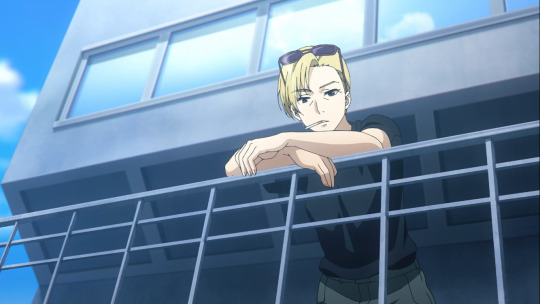
Why do I clock the German major general Heidemarie as a lesbian?
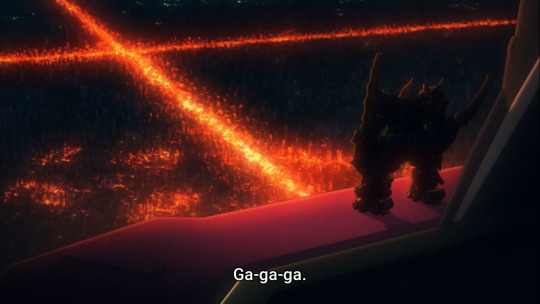
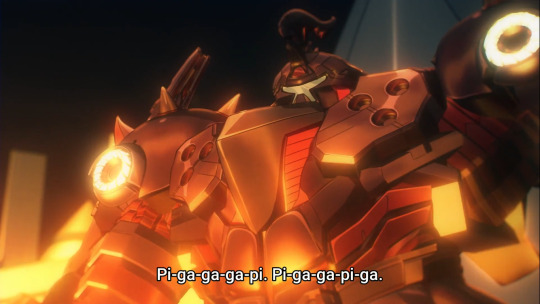

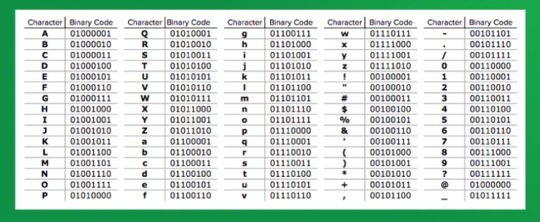
So what if “ga-ga-pi” is some kind of a code, similar to Morse code or the binary code? Lulu has her “ga-ga-pi.” The other Deathdrive has its “ga-ga-ga. Pi-ga-ga-ga-pi. Pi-ga-ga-pi-ga.” The sequence is different in order to convey another meaning. The only solution is how to interpret it. Or perhaps, I am just overthinking.
So what are the Death Drives?
From the series’s glossary:
Death Drives : A mysterious mechanical life form that suddenly attacked the earth. Their goal is to achieve the best "death" that each of them wants. They came to this earth around all the galaxies in search of an existence that will fulfil their wishes.
Those drives sound like a part of Sigmund Freud’s psychoanalysis’ theory, the theory of pleasure principle (Lustprinzip).
Did Masami Obari, the director, turn to the Austrian psychoanalyst to gather the blueprint for his latest work?
(I know that Freud doesn’t have many fans among the Tumblr folks. But he “is” my neighbour. After having seen “Freud’s Vanished Neighbors” and read an article that the Viennese didn’t accept him as part of the community because he was not born in Austria and had Jewish family, and was still referred to as “Zugeraster,” a derogatory term for an outsider, he earned my respect and like everyone who was born centuries ago had other mentality that was not at all fitting in the modern era.)
Deathdrives, or death drives, in Freudian psychoanalytical universe, mean Thanatos, Todestrieb in German, is a term that describes: the drive toward death and destruction, often expressed through behaviors such as aggression, repetition compulsion, and self-destructiveness.
From Freud’s book, “Beyond the Pleasure Principle” :
Our departure point was the great antithesis of life drives and death drives. Object-love itself shows us a second such polarity – that of love (affection) and hate (aggression). What if we succeeded in connecting these two polarities, what if we succeeded in tracing one back to the other! We have always acknowledged a sadistic component in the sexual drive; as we know, this component can develop a life of its own and turn into a perversion that dominates a person's entire sexual life. It also occurs as a dominant partial drive in one of those forms of organization of sexual life that I have termed ‘pre-genital’. But how could we possibly suppose that the sadistic drive, which aims to harm its object, derives from Eros, the preserver of life? Isn't it altogether plausible to suppose that this sadism is actually a death drive that has been ousted from the ego at the instance of the narcissistic libido, and as a result only becomes apparent in conjunction with the object?
So you have the enemies, the Death Drives, ready to destroy the humans, and Bravern on the other with the quality of being the Eros. The sentient robot’s ethos is to save the humanity first. All the while obsessing with his pilot, Ao Isami. Obsession and kindness overlapping.
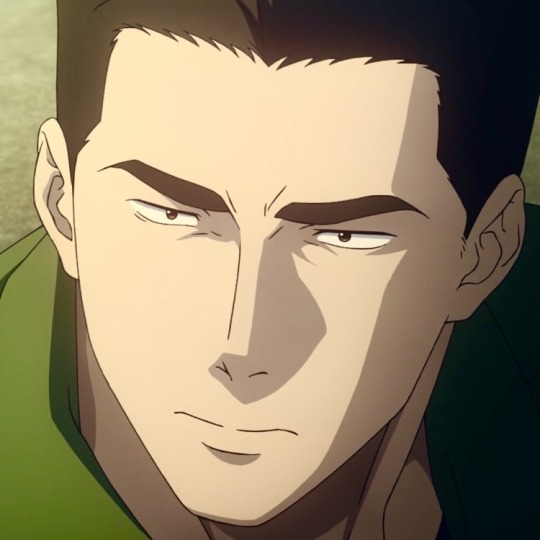

@whypolar analysed their names, then doing some googling of the meanings of both Isami and Lewis’ names, it seems the two share the same description. Yours truly is not at all a Japanese language expert, this website suggests that Isami has 21 variations in kanji.
勇 means "bravery, courage."
Brave - Showing courage and strength in the face of danger or difficulty.
Daring - Willing to take risks and try new things.
Strong - Having great physical or mental power.
Courageous - Having or showing courage in the face of danger or difficulty.
Resolute - Firmly determined to do something.
Soldier - A person who serves in an army.
It describes Isami’s personality perfectly!
Lewis, on the other hand…
From the celebrated author of Alice's Adventures in Wonderland, Lewis Carroll, to lauded actor Daniel-Day Lewis, a boy called Lewis is in good company! Lewis is of German origin and means "Renowned warrior." It has many variations in Latin, French, and Gaelic languages that all point to the same sentiment of “strength” and “courage”. With the name Lewis, you can hope to instill your baby boy with a fearless optimism for life.
All three of them—Bravern, Isami and Lewis—are “strong and courageous.”
#bang brave bang bravern#yuuki bakuhatsu bang bravern#ao isami#lewis smith#isami x lewis#heidemarie#death drive#sigmund freud#masami obari#bravern thoughts
76 notes
·
View notes
Note
I'm from the Appalachian region, and for you my fun fact is more historical and less cultural, but when John Denver sings about how "life is old here, older than the trees" in Take Me Home, Country Roads… he isn't kidding. The Appalachian mountain range is so old that some outcrops formed during the Precambrian era—it's older than bones!
As for more cultural stuff I'm still in the middle of learning (which is to say, take it with a grain of salt) about the American Deep South, from what I understand, there's a belief in the compulsion of restless spirits (referred to as Haints which iirc is derived from "Haunts") to do repetitive tasks, such as reading and counting. Since these compulsions kept them at bay until their power faded and they could no longer harm you, people would hang brooms above doorways (they count the bristles) or paste newspaper to walls for them to read, or pour out jars of say, dried beans for them to spend the night counting rather than getting to the people inside. There's also the belief in a specific sky/water colored paint ('"Haint Blue") that people would do their porches and window frames up in, because they believed it helped to keep the spirits outside of the home and from influencing the people inside. And if you've ever seen a bottle tree (a tree with its branches covered in similarly Haint Blue bottles) it was used as a trap for spirits, as they could get in to the bottles but not out due to the color, and then evaporated in the cleansing daylight.
There is also the belief that to refer to something by its name is to call it to you! So you better make sure you choose your descriptions carefully.
Thanks for inviting a little cultural appreciation! I hope what little I could share was fun.
I feel like I vaguely heard this fact about the Appalachian mountains being old af somewhere but that was a lot more specific and blows my freaking mind, omg.
also i'm wheezing (/pos) at the thought of keeping spirits at bay with just. menial tasks. like "OOUOUU I'VE COME TO HAUNT YOU- oh shit that broom has so many bristles on it i gotta count 'em, stay right there debra, i'm still gonna haunt you after i'm done" FDJASKLFJDASKL like are these really ghosts out to harm people or are they just like, funny lil' guys who are severely understimulated 😭😆💓
also that "calling something by its name to call it to you" is 1.) very fae-like, I love it, and 2.) vaguely reminds me of the whole "if your ears burn that means someone's talking about you" type thing (in other regions it's "if you sneeze" and other variations of involuntary bodily functions like that). Or like the "knock on wood" thing where you knock your fist on a table after saying the possibility of something that could happen in the hopes that it will keep that possibility away from you. So yeah that's cool (and super fun!) that there are even more variations of that!! Thank you for sharing!!! <3
32 notes
·
View notes
Text
The Last Ishmael OCD Post
One of my first times that i dabbled into character analysis was about Ishmael's OCD, people like that post but i really feel i could have done better
Canto V was my last major chapter i was willing to read. As i put more distance between me and the story, i want one final farewell in the form of finally fixing up my analysis
PART I: THE META-TEXTUAL
Before i delve into the writing itself, here is some pointers the story gives to her OCD in the form of flavor text and descriptions.
Firstly we have her Bio

This is easy to miss as its just a tiny blurb above her whole intro blurb.
Now, "obsessive compulsive neurosis" is a very weird way to phrase it, "obsessive compulsive" is clear enough but "neurosis" is odd, this is not TOO odd though, as "neurotic" used to be how OCD was classified as a disorder.
However if we look at her bio in Korean, the particulars do simply straight up say "OCD" very clearly, you'd need to MTL but this was also confirmed to me by a friend from SK
The sinner bios are biased though, and are written through a very corporate lens, so lets see if there's any other pointers elsewhere
Her base EGO, Snagharpoon, actually does just that

Her passives name is called "Compulsion" and in its gameplay design its a very interesting way to also point to it
Ishmael is a very all or nothing person, you do it well or you don't do it at all, and this is reflected on how this passive aids you to play
This passive is excellent for boosting the consistency of playing by only going for "Favored" or "Dominating" clashes, while punishing you for taking chances on clashes you MIGHT win
Base ID Ishmael is also a unit with all single coins, rolling tails puts her in a very unfavorable position so this also adds an extra safety net on top. Worth noting being all single coins is also a high risk high reward type of play style.
Finally we see two more pointers id like to note, both from Canto V

The Compulsive`s Knot, an ego gift themed after a naval rope, one of many in the dungeon all alluding to her struggles.
Most obviously though

Her exclusive status effect, Compulsion. This is in direct reference to her EGO passive, providing an attack boost at the same time it provides a drawback in the form of low SP.
We are gonna talk a bit more about this passive since it ties into another gameplay oriented way to point towards her OCD
During the story dungeon we have an event where a noise is heard, you are given two choices, check, gain SP, don't check, lose SP.
Compulsive checking is probably the most well known (to the conditions detriment we will talk about it later) hallmark of OCD
Notably, this doesn't aid Ishmael, while checking can avoid the combat encounter, not checking only has a chance of triggering it, and most interestingly, her SP will always start at -25 during combat encounters. Meaning the temporary boost in her sanity will just get reset next battle, should you decide to check. Checking wont satisfy her anxiety for more than a brief moment.
Lastly the most obvious ones are all the references to Obsession. These are so abundant i feel if you are familiar with the Canto its redundant to have them, i wanted to draw more attention to the allusions to compulsion, as they are less common.
PART II: BEFORE THE STORM
Even since before her own Canto, we can see Ishmael's ruminating and anxious tendencies pop up during previous chapters, which for OCD is important to explore as OCD is an anxious and ruminating disorder.
So lets talk a little bit about OCD! Its a disorder characterized by repetitive and constant intrusive urges to perform a task or a thought (lets keep this in mind for later)
These thoughts or actions are used to try to relieve stress from an anxiety inducing thought or situation. The most common example is OCD exacerbating germ phobia, and causing people who have it to wash their hands in excess.
While OCD is usually described as "irrational thoughts" i feel that's a pretty limited way to view it in my own experience with it. OCD compulsions and thoughts can be informed by very real worries, the worry of getting sick, of making the wrong moral choices, of hurting others. Being clean is a normal and a good practice to stave off getting sick, its the frequency and intensity that turns it maladaptive, OCD turns your own lived fears and traumas against you, and those might very well be real things to worry about, which makes dealing with it very hard.
Enough of that off to the writing!
Lets start with Canto II


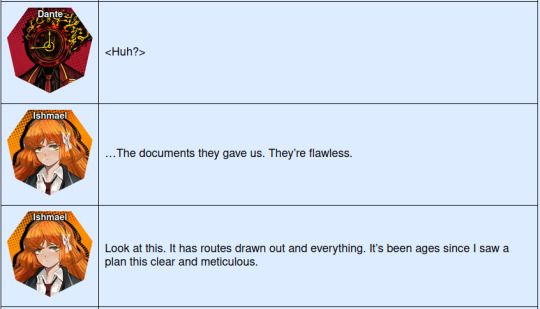
This is the first example of her constant need for a lack of ambiguity, previous to this we see her complain about the treatment the sinners are receiving from Effie and Saude, skeptical of the whole deal.
Until shes shown the plans, they are so well crafted shes able to anchor to that and calm down.
This by itself is not really much other than being very detail oriented, lets look a bit further into the chapter

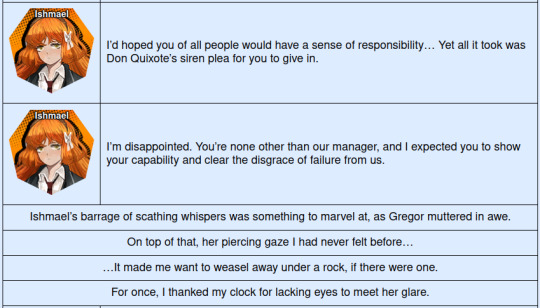
Here we see that aspect elaborated upon more, this moment is framed as a very important one between Dante and Ishmael in their dynamic later on, Ishmael is incredibly upset at the plan having fallen apart so quickly, while yes this is not unreasonable to be upset at, her anger is remarked on by Dante and Gregor as very intense and unusual. This in my opinion is a minor but clear indication her need for planning and considering every option is due to a deep anxiety, but don't take it from me, lets look at Canto III
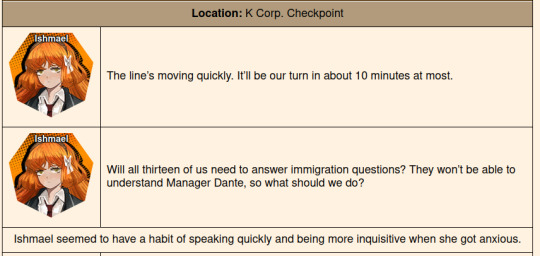
Here we are told pretty explicitly, Ishmael moving quickly and asking lots of questions is something Dante has noted as an anxious habit.

And here we have more elaboration on what exactly that moment at the Casino meant for Ishmael, it was enough anger and disappointment she has stopped expecting Dante to perform well and instead taken it upon herself to see things go according to plan, this is VERY important to her.
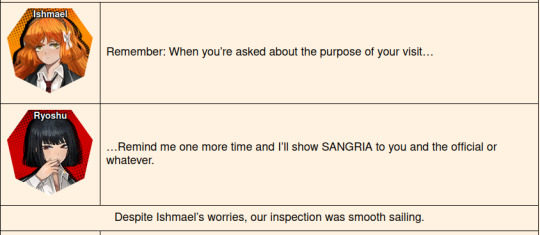
And her worries, are repetitive enough to annoy others, and to be remarked upon by Dante.
This is perhaps the more notable chain of events to point out previous to her chapters aside from 4.5, as it helps contextualize all her usual ways of acting in a more complete light, showing a lot of this is driven by a deep anxiety
And this all makes S.E.A all the more interesting as it pays off on this.
Something i quite enjoy about Limbus is how it re-contextualizes things characters have previously done and said. And the events of S.E.A and Canto V bring a lot of interesting stuff to the table
Lets get cracking with this chapter
In general shes extremely confrontational, and tense, more than usual

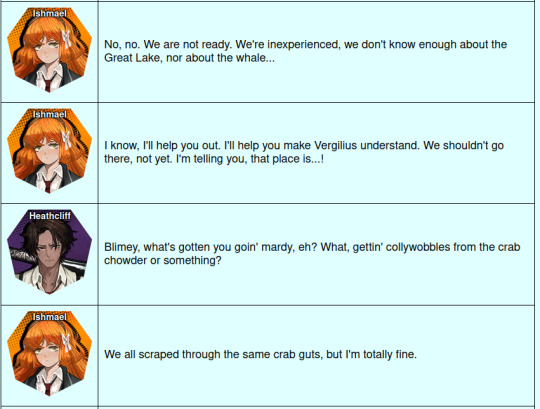
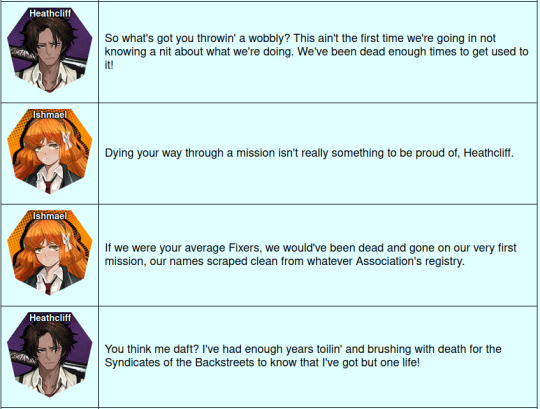

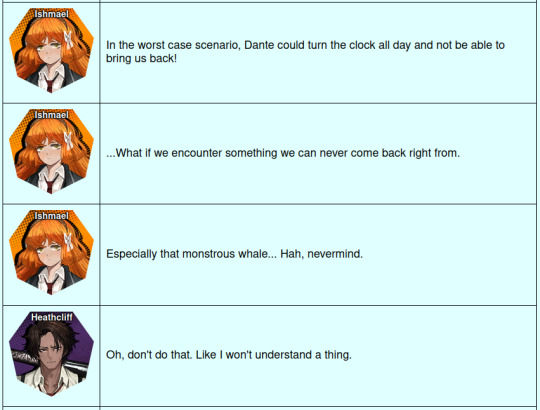
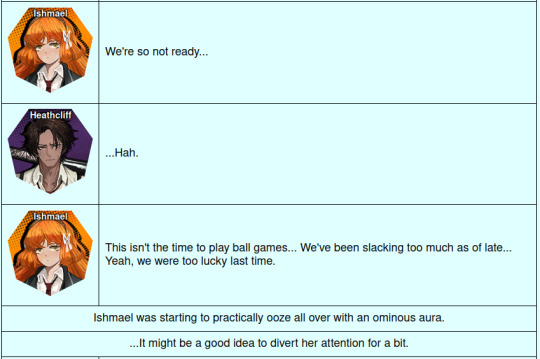




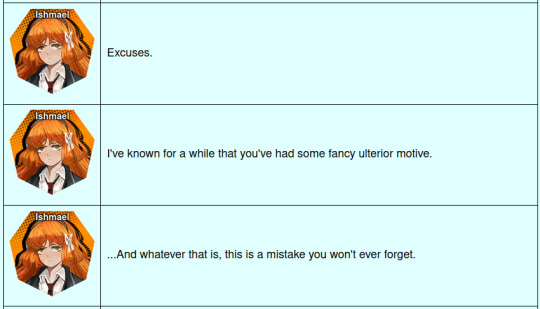

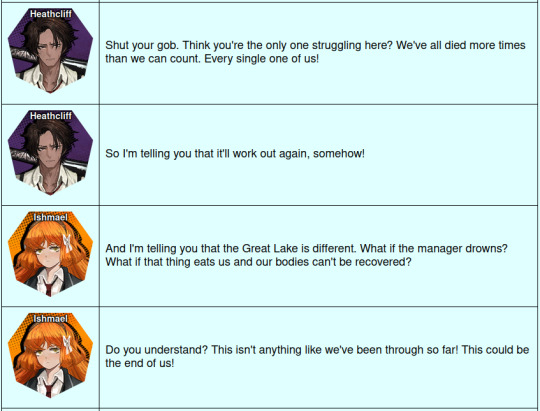
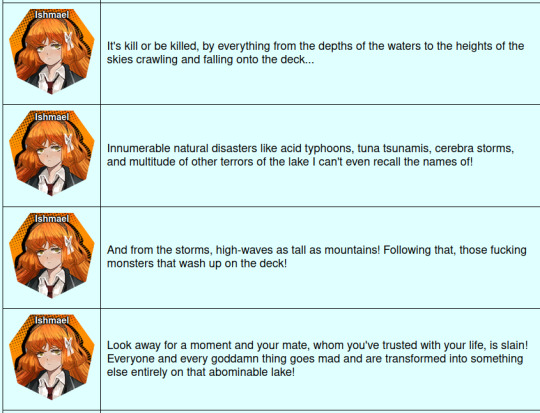
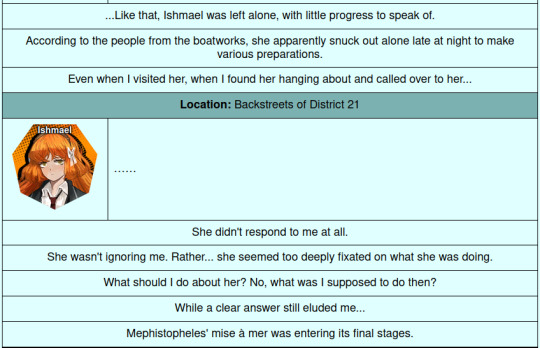
But its her anxious outbursts i wanna focus on, what she puts
emphasis on.
This chapter is so crucial in this whole analysis. We see some behaviors way more clearly now, firstly we see her emphasize her need to be absolutely 100% prepared for this, no ambiguity no risks she wants certainty.
But we see something even more clearly and that's her ruminating behaviors, shes brought up things like this to a smaller extent before like commenting on a lot of aspects but here we see in full display her inner world become externalized, shes started voicing worries shes never voiced before can Dante turn them back always? What if Dante dies? What if the sinners get eaten can that be turned back?
And these don't all get brought up immediately, she mentions them in different conversations, pointing to the fact shes constantly going over the subject in her head with no pause, and she gets frustrated when she cannot work on these worries when she cant do anything to quell the anxiety.
And the last part, when Dante finds her so fixated in her planning its impossible to even talk to her. She has to perform some action do something to stave off the disaster she can see coming in her head
As someone with OCD inevitably i have to mention the personal component that drew me to analyze this was how real this feels to when you spiral
A lot of the times OCD is explained as the compulsions being something you do cause you feel its a sort of ritual to stave off disaster. Its in this way i see it reflected in this moment.
As we see with Heathcliff acting as her foil, he points out her worrying is really not doing much other than just her talking and talking, and by the state shes in when Dante checks in on her, aimless not even paying attention to anything else we see the main objective of the planning really isn't practical as much as a compulsive coping mechanism.
She has to do something
PART III: INTO THE DARK
Lots to cover and honestly i will make a companion post to this with all the examples, so for this section i wanna cover some highlights instead, as well as a general discussion of the tone.
The way this chapter is structured is very interesting, its really reflective of the mental state of Ishmael. The chapter feels really aimless, they wander around not really ever finding what they need, which drives Ishmael more and more tense and frustrate
Its a good continuation to how we see her by the end of S.E.A fixated on one goal one thing
As previously stated shes inflicted with a constant special and unique to her status effect called "Compulsion" as covered in Part I
Her behavior is also reflective of this
For a good part of the first third of the chapter shes in her room, the whole time whetting her harpoon, nonstop
However you might notice compulsion is not as present as obsession, and compulsion is also important to OCD its in the acronym! And i have seen others point to it too
However id like you to remember, in the post earlier i said thoughts can fit into OCD, compulsions can be mental and sometimes almost exclusively or mostly mental. Its even in the DSM noted that for diagnosis the compulsions to count you for a diagnosis can be mental in nature
Its in this aspect that i feel Ishmael shines a lot
In general OCD in media is lacking in representation and is often a trait given to assholes or villains
The normal conception of OCD in movies or TV is of neat freaks or control freaks, Compulsion is usually heavily emphasized when it isn't the whole picture
Often ignored though is the aspect of Obsession, some people can have Purely Obsessional OCD (Pure O), this isn't a formal diagnosis or term but its colloquially used by people who have it. Its a bit of a misnomer, as compulsions are present but internalized as mental rituals or rumination
Usually its harder to diagnose, its harder to treat as there's no apparent compulsions others can see, and the people having it seem pretty high functioning to the people around them.
This can be noticed though in people avoiding certain subjects, avoidant behaviors can be the clearest external behavior.
I personally read Ishmael as having more mental compulsions, the way she tends to be a more ruminating and anxious character than outwardly compulsive
During S.E.A and Canto V we see outward compulsions more but from the examples from previous Cantos we can see that's not her usual and she operates more on anxious overthinking most of the time.
However another aspect that ties into mental compulsions is in the previously mentioned avoidant behaviors, we see her isolate and try to stave of having to deal with her worries in both S.E.A and the beginning of Canto V when shes in her room, in both cases doing some excessive preparation in a compulsive way.
CLOSING THOUGHTS
As previously stated Canto V deserves its own companion post, and ill work on that later, i feel this encapsulates what i wanted to say well enough.
I wanted to discuss the previous signs of her behaviors that make me certain her OCD is an intended textual read, and in my opinion a well executed one
Canto V was hard to read as it felt very real and very familiar to the worst times i have had due to my OCD.
Shes a character that despite my distaste i have developed for the franchise, it will never stop meaning a lot to me same as her chapter will always be a piece of storytelling that affected me deeply in ways others haven't
To close i want to leave off what i feel encapsulates the feeling pretty well, in my favorite moment with the membrane consuming her as a metaphor for letting fear, anger, obsessions and compulsions cloud your mind until you forget why you were even there
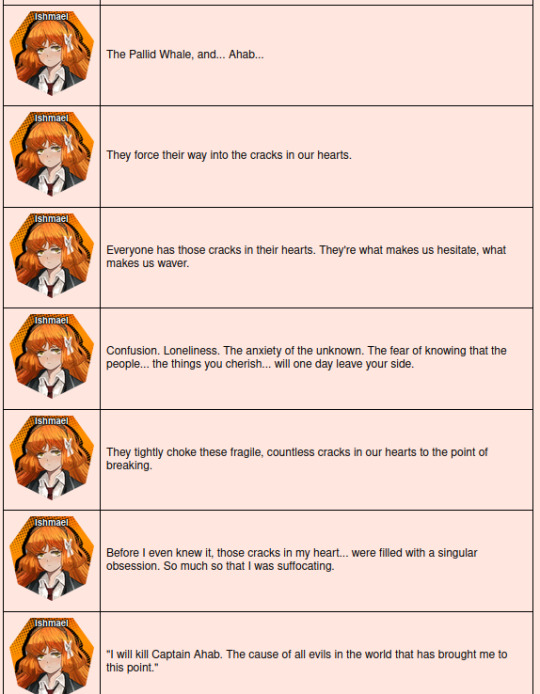


To you, dear reader, Bon Voyage
#ishmael lcb#ishmael limbus company#project moon#lcb ishmael#canto V#canto v spoilers#limbus company#lcb
53 notes
·
View notes
Text
i keep getting jump scared by fanart that even slightly reminds me of wilb*r and goddamn its so sad man. like five years of following, loving, and adoring someone and never did i think there would come a day where id feel sick being reminded of his existence...
however looking back, it makes sense. i definitely do have repetition compulsion and keep subconsciously getting attracted to the same type of abusive and dysfunctional person. so it absolutely makes sense that the person i started adoring when i was 17 and so deep into being constantly abused, turned out to be exactly like my abuser (my dad).
its a sad but helpful reminder. something i wont ever forget and something i wont EVER repeat. im so done with finding abusive people and letting them traumatize me over and over again. and i mean that in the sense that i kept finding people like him (my dad) to date, to be friends with, and also unfortunately...to idealize. thats embarrassing to admit to but its the truth and im choosing to be compassionate towards myself. how was i supposed to know who to pick when i knew nothing but how he treated me yk?
and thats all thanks to shelby. ive sent many (probably too many) asks to shelby already but honestly, i can never thank her enough for the wake up call. for snapping me out of this cycle of abuse i was stuck in even when it comes to people that were supposed to be comforting and entertaining to me. for teaching me how to see all these signs of abuse i missed and ignored in my own personal relationships because i thought the person "wasnt that bad" or "didnt actually mean it." she showed me that we deserve better by being so brave and im so goddamn thankful. im thankful that im no longer supporting an abuser, that i now know the signs of more subtle versions of abuse and im most importantly thankful that shelby is safe and so very loved.
i feel like ive grown so so so so much since february and i hv shelby to thank for most of it. her and jo my best friend.
anyway, here's to healing and putting abusers behind us 💚
#feeling sappy tonight#in the best way possible#shelby grace#shubble#shelby support squad#charlie.txt
25 notes
·
View notes
Text
Surviving Rock Bottom

🌼 For inner planets in 8th house natives; after crisis - before transformation = the stage of neuroses.
🌼 Before every transformation for 8th house natives, they are trapped by neuroses; they shed their skin after neuroses to reborn - this is almost constant in their life, but also happens at least one major rock bottom stage that they must learn to handle. Whatever may be the trigger, these natives face intense emotional crisis. Their life begins to get out of control - heart break, job loss, divorce etc. They fall into a downward spiral of ruminations, before they are consciously aware of it, they spend hours everyday thinking about the past with painful emotional outbursts. Ruminations are repetitive thoughts revisiting the same events from past. As we all know that 8th house placements are hallmark of intergenerational trauma, this crisis is the call for healing. This stage of life is called neuroses; it was also called hysteria in old days.
🌼 Carl Jung has said "in all chaos there is a cosmos, in all disorder a secret order, in all caprice a fixed law for everything that works is grounded on its opposite". The natives are yet to know the reason behind their suffering. Unfortunately, if they are lonely, it can take years for them in rock bottom, spending each passing day in the insanity. It is not so simple to get out of this obsessive rumination for the natives - otherwise they would do it already. They cannot just "choose to not think these thoughts" - this is what makes the rumination so powerful, this is what feels like fate, a doom, a curse.
🌼 The reason why these natives fall into this spiral is the heightened negative feelings. As we know that the 8th house signifies the territory everything that is hidden and unknown. This uncertainty of who they are (lack of sense of self) and where they are going (life path) compels them to seek certainty in life. 8th house placements are unfortunately not gifted with a "sense of self", they feel like invisible energy, like a jellyfish they feel transparent and attach themselves to people, things, interests, addictions and make it their whole personality. When in relationship, they mirror and depend on their "favourite person" for the validation of their existence. This relationship must break at some point in their life because they are also prone to invest themselves in wrong type of people, ignoring red flags and being irrational rather than logical about life choices.
🌼 Apart from astrological view, in the words of science, they are genetically predisposed to such neuroses states. In addition to this, their parents also create disturbing environmental influences for them to develop chronic emotional illnesses. These disorders are inherited - what we call "ancestral karma".
🌼 When the child never learned emotional regulation from their parents and also genetically prone to neuroses, they recall the negative material, negative "autobiographical memories" of the past and negative emotional state all the time. Gradually they fall into depressive states, ruminating about the events of childhood and fixating on negative emotions. If you are an 8th house native, you know exactly what it feels like - no words can describe what is only experienced by the fallen hero.
🌼 Some symptoms of this spiritual crisis are 1. Obsessive rumination 2. Compulsive behaviours as a routine 3. Depression 4. Apathy towards life (Nihilism and hopelessness) 5. Negative intrusive thoughts 5. Phobias 6. Perpetual anxiety state.
🌼 Lots of natives go to therapy and hospital in emergency to protect against suicidal ideation, self harm and self destructive addictions. Indeed in such cases, pills and medicines are necessary to rescue the natives from their crisis. However, Carl Jung writes that this crisis is the harbinger of soul transformation. He writes that anxiety is the attempt by psyche to self cure the trauma. He writes to 1. Experience the trauma rather than numb the symptoms with pills; 2. Identify the meaning of neuroses; 3. Understand what the neuroses is trying to tell/teach you; 4. Identify the purpose of neuroses in your life; 5. To go from infantile attitude to psychological development.
🌼 Unfortunately, I have seen natives with these placements never being able to cure their neuroses and instead fall into lifelong alcohol addiction problems that spoiled their family life and caused many miseries like road accident and early death. This shows how powerful and strong the anxiety is. If they belong to below middle class sections in society, they can even end up homeless and helpless (though 8th house is also connected with other people's money so they could be supported by spouse income or parental income).
🌼 There are some reasons why natives fail to get out of neuroses or delay it: 1. Laziness; 2. Lack the courage to face the challenge of life; 3. Lack of awareness or support system; 4. Fear of change. Though this is not a definite list. Never underestimate the power of neuroses; 8th house transformation doesn't always mean "something beautiful is born out of the mess". A lot of natives simply "transform for the worse" - they do not improve, they do not actualize, they just remain there in self destructive cycles. It is that scary. It is survivorship bias to assume that all 8th house planets will become spiritual and awakened - a lot of them do not and we never hear their story. So, if you are one of those who find themselves near self awakening, please grab the opportunity and get your life on track.
🌼 Therefore, it is crucial to understand that this neuroses is the urge to develop your own personality. It is a call to change your attitude towards life, to change your way of life, to not conform to the herd mentality, to focus your energy on living in the world rather than in your head, to attain psychological independence from your parents, to contribute to community as a responsible worker, to find a purpose in life. It is the call to do self actualization and attain self knowledge, although it is dressed like a nightmare with a hidden gift.
🌼 Do not waste anymore of your energy on internal conflicts, reliving the past memories and processing the trauma that happened to you. There is only one choice in life - to move forward or to regress to the immature and infantile mode again. Your are intuitive, you KNOW the answers in your heart. I always read about the "transformations" of 8th house natives but never really found an answer for what exactly transformation means? Is it magic? Or is it some legitimate process? I finally found the answer.
This video describes the concept:
youtube
Here is quotes from the video:
“What direction the patient’s life should take in the future is not ours to judge. We must not imagine that we know better than his own nature, or we would prove ourselves educators of the worst kind…It is better to renounce any attempt to give direction, and simply to try to throw into relief everything that the analysis brings to light, so that the patient can see it clearly and be able to draw suitable conclusions. Anything he has not acquired himself he will not believe in the long run, and what he takes over from authority merely keeps him infantile. He should rather be put in the position to take his own life in hand.”
- Carl Jung, Some Crucial Points in Psychoanalysis
“Only boldness can deliver from fear. And if the risk is not taken, the meaning of life is somehow violated, and the whole future is condemned to hopeless staleness.”
- Carl Jung, Symbols of Transformation
This transformation can take years and this is the rebirth of the Phoenix. Rising from the ashes into a new life. Starting from scratch. Shedding old skin. Burning bridges. Reborn. So many names.
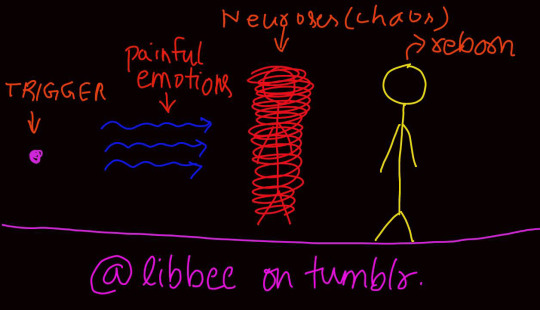
#astro community#astro notes#astro observations#astro placements#astro tumblr#astroblr#astrology#astrology blog#astrology notes#astrology observations#dark astrology#venus in 8th house#moon in 8th house#Mercury in 8th house#8th house#Carl jung#Occult#self development
269 notes
·
View notes
Text
Kafka's fiction often confronts its critics with a collapsed or collapsing center of authority, a dead or powerless father, who condemns those in his orbit to a circuitous ruin. No one or nothing is in control; no one has the power to authorize. And yet all the subjects still seem to be controlled and continue to work. This paradox of inertia and ceaseless activity, of masterlessness combined with continued servitude, is the central feature of one of Kafka's most interesting parables, "Eine kaiserliche Botschaft." Michel Foucault's description of certain texts as heterotopias is particularly relevant for Kafka's parable, because it names the possibility of a text or system composed of disconnected infrastructures, a text made up of asymmetric parts which can only work or operate provided there is a condition of disorganization or entropy, a mechanics of resistance, frustration, dysfunction. Kafka's texts, like the heterotopias Foucault describes, display this kind of perverse operating procedure whose economy is initiated by the collapse of the center, often represented as the death of the father, and having clear Oedipal aspects.
It is in the Oedipus complex that we might locate the mechanism of resistance (the "machine desirante," to appropriate Deleuze and Guattari's anti-Oedipal term) that at once accounts for the absent father and makes possible the work of his subordinates in the shadow of his absence. The Oedipal situation is responsible for at once an imposition of its regulatory apparatus over the father, its "symbolic" content in the Lacanian sense, which results in the slaying of the father, and a suffering of guilt and loss of control that such an absence of the father inaugurates. What we must realize is that such a complex or mechanism of desire does not serve so much to inhibit or limit Kafka's writing to a simple principle, a constellation or dynamic which in itself becomes a substitute for the center effaced within the text, but that such a complex is an entropaic principle of dispersion that curiously energizes a thematic or semantic field of fragmentary particles. [...]
[…] Freud's little Hans, the "Du" or dreamer of the parable is attempting to gain or imagine mastery over a parent, and in the Kafka parable this constitutes wishing mastery over a father by at once desiring him dead and alive. What carries the force of this ambivalent, Oedipal network of desire is the message which delicately affirms the simultaneity of two wishes that are contradictory and yet mutually supportive. The one wish, let us call it thefort-wish, would like the Emperor to die, because the dreamer of the parable (us) would like to be the father. The slaves would like to become the master. However, in order for that wish to be realized, the father or Emperor must never truly disappear, since he is the Law upon which even usurpers depend, without which there would be no such thing as usurpation. Thus there has to be a da-wish, the desire that the Law be upheld and exercised. This Oedipal network of desire is carried by the message in two distinct senses: as pardon and as invitation. As pardon, the message carries both the subject's "crime," the breaking of the Law or denial of the Father (fort-wish), and the fact that the Law is still in effect, that the Father is still exercising power, is still present (the da-wish). As invitation, the message requests that the subject come into the father's presence (da-wish) even if time and space preclude such a journey, such a possibility (fort-wish). There is, finally, the Emperor's asking the servant to repeat the message, the repetition compulsion, which establishes at once that the message has, indeed, left the deathbed (is fort!) and yet remains within the possession of its author or authorizer, the exerciser of the Law (is da!).
—Herman Rapaport, An Imperial Message: The Relays of Desire, MLN, Vol. 95, No. 5, Comparative Literature (Dec., 1980)
7 notes
·
View notes
Text
Errortale: a summary.
...
It took some repetitive efforts. Frequent reminders. But he was receptive to the attention and truly does have exclusive access to some indispensable informants from... beyond.
"Errortale," as they call phenomena like him, could be a subtype of outcode in its own right.
There is a place like the Omega Timeline. A somewhere that's nowhere, with no features of its own but endless expanses of white except for what you bring yourself, no entrances or exits except for those who already know the way.
What sets this antivoid apart from the Omega Timeline is... the effect it has on anyone who, by some unfortunate glitch or botched cheat, gets stranded in it. Time behaves differently there, so it is difficult to say how long it takes, but staying there too long there eventually causes some kind of data corruption.
It begins with restlessness. Then, somehow, it causes the affected to develop involuntary clairaudience. (Note: It was not found that this "divination," for lack of a better term, could be attributed to hallucinations, plurality or a hivemind between others affected due to how "the voices" are capable of knowing/perceiving things the listener(s) could not, and the presentation of this condition does not align with ▢▢▢▢▢▢.)
This is, as far as we know, the point of no return before it is irreversible, as the effects begin to accelerate. The appearance of "ERROR" alerts over their bodies. Memory loss. Personality changes. Mental instability. Glitch artifacts. Colors changing and inverting. The final stage seems to be the development of completely new magic– which first presents after extreme distress and may leave a permanent pattern on their bodies– exclusive interactions with the antivoid, such as using it as displays or portals to different times and places across the multiverse, and a compulsion to return to it and resume isolation.
(Note: data corruption seems to plateau past this point. Hypothesis: failed data conversion?)
This happened to...
...
He'd been testing his abilities. He was warned it was risky. It was true, and something did happen. ▢▢▢▢▢▢▢▢▢▢
...By the time he could escape the antivoid, he barely remembered his own his name. And when he did escape, he didn't know he'd gone to not just the wrong timeline, but the wrong universe. He tried to reintegrate as if he'd gone back to his underground days of back-and-forth knock-knock jokes with her majesty Toriel. But when he discovered he'd landed in a Tale where all monsterkind were ghosts... he had a violent breakdown, and his eyesockets filled with blue strings that fell like tears and left stains on his face.
And then Spectertale was torn apart.
Perhaps it's because of this revelation's impact on him, or perhaps it's because of which Sans he used to be and what thoughts filled his skull when he was corrupted. But ever since this incident, he has been driven to do the same thing over and over again: find deviations from the Alpha Timeline and analyze the extent of these deviations before deleting them.
But it is as Core!Frisk has said: for every iteration destroyed, a duplicate iteration is also spared due to how intersecting timelines behave.
Of course, this does not stop "Error!Sans" from using his strings to puppeteer people by their SOULs, or steal people from their timelines to kill immediately, to hold hostage or to keep their SOULS as trophies. He has especially done this to Frisks to prevent them from Resetting after he wreaks havoc... just like... like...
like what almost happened in... Aftertale.
... ... ...
At some point. I saw this. They didn't see me but I saw that when... when Error!Sans... when he went to a common Underswap variant, he took his alternate self hostage after using the strings to pit him against his brother.
...He couldn't remember the details, but the voices did. The stolen Sans nicknamed "Blueberry" tried to appease Error!Sans, to get his guard down, learn more about him. And he did learn about Error!Sans' affection for Undernovela as if it were a TV show, about his escape from the antivoid, about Spectertale. "Blueberry" hoped to escape, yes, but he also hoped to get Error!Sans the help he needed, thus reducing the threat he would continue to pose. And Error did begin to trust the alternate from Underswap, but "Blueberry" tipped his hand and lost what little control he had over the situation. Error didn't kill him, but he left him in the antivoid. And Error came back too late.
...
"Blueberror" was (justifiably) angry, but would ultimately let go of Error before his outrage similarly caused permanent damage to his mental state. He would instead offer his services to the Frisk in charge of the Omega Timeline, employing his "starry" powers and even letting an uncorrupted version of himself take his place so his timeline's Papyrus wouldn't be alone. He is unstable, but he is not dangerous like Error. And especially not like Error!Undyne.
Error is not as proactive as he claims, but Error!Undyne had been looking for... me? Yes. That's right. she was looking for... me. And she and an Error!Papyrus with her who could hold SOULS hostage in bubbles... they had an uneasy agreement with Core!Frisk not to interfere with each other. But Errors can be set off by upsetting revelations, and that's all it can take to drive them to indefinite vengeance.
...There was a chance encounter between her and Error!Sans when he was wearing glasses. They couldn't have been my current frames, but... but that... that was... that was what she saw them as... and from that moment on, there would be no calming her. Blueberror was able to find and convince... Error... to face off against her, if only because he already held contempt for her. They were able to deal with Error!Undyne together, though Error!Papyrus had been lost track of, and the alliance between Error and Blueberror broke off soon afterward as... as Error... ...as 🅶🅴🅽🅾 vanished again.
...Blueberror came back to the Omega Timeline, and has been staying here ever since then.
...
I will have to gather my thoughts on this.
I have to... I have to... I have to...
...I...
#errortale#coretale#underswap#spectertale#undernovela#aftertale#antivoid#alpha timeline#omniverse#undertale#utmv#archive#soul exchange#ap#summary#txt
16 notes
·
View notes
Text
Omori and its parallels with OCD, or my personal connection to this game
SPOILER WARNING: AS USUAL, MAJOR OMORI SPOILERS FOR MOST ENDINGS AND THINGS.
CONTENT WARNING: MENTIONS OF SELF-HARM, SUICIDE, SEVERE MENTAL ILLNESS, DEATH, LOSS AND OMORI-TYPICAL CONTENT. I will also be referring to my own intrusive thoughts a lot, so please take caution if it might trigger you to spiral.
DISCLAIMER: I AM BY NO MEANS A MENTAL HEALTH PROFESSIONAL. I am in the process of seeking a diagnosis (we're getting there :) ), but it has been otherwise confirmed by professionals that I experience OCD. This post is about my personal experience with OCD and trauma, and the way I believe these feeling manifest in the game. I don't believe Sunny or Basil experience OCD, but I want to compare my experiences with obsession, compulsions and trauma-related OCD. Other people may have completely different experiences, and those are valid!
You could call this catharsis, some form of healing. Really I'm doing this for myself, which was kind of why I started writing Omori analysis in the first place (???). and im a nerd for this game
Guilt
Guilt has always been one of my biggest hurdles, and it's also a very relevant theme in Omori.
For the longest time, my brain and I have been actively trying to develop compulsions to cope with guilt, and it seems to consistently fail. I've tried singing songs on repeat, extreme self-harm, distraction, avoidance ect, and nothing seems to work. Sure, I've never committed recital day, but even small things can make me feel horrifically guilty, as my intrusive thoughts tell me I'm a horrible person or a liar.
I see this in Sunny, too. For the longest time, his mind has been trying to cope with the guilt, and it chose to delve deep into repression. But no matter how much he represses, the truth is still there, and so that guilt is still there.
The Fear Polaroids in the Omori Route are also a representation of guilt, as is the mirror during the Truth segment, both depicting Sunny has a hideous demon. My intrusive thoughts depict me as a demon, too, doing horrific things to myself and others. The images of mutilated, demonic Sunny capture the... inhumanity that my mind makes me feel.
I get it, Sunny. I don't feel human either.
Mewo's Death as an Intrusive Thought
Cat Dissection is an interesting area of Black Space, in that its immediate relevance to the truth is less obvious. It's also one of the more horrifying ones - on my first playthrough, I was running blind, and I figured you'd have to kill Mewo for the key. You do not. my biggest regret
Mewo is obviously linked to Mari, but at the time, we'd only ever seen this slightly mentioned in the real world photo album. At that point in Black Space, Mewo was closely tied to Sunny and Omori, being an essential part of White Space.
The player can stab themselves to get out, or cut open Mewo and suffer the regret. This room feels very reminiscent of a gruesome intrusive thought that just won't go away, those days where you see yourself murdering all your friends, or violently injuring yourself. Much of Sunny's hallucinations, or creatures like Something, also mimic this kind of thing.
That room has far deeper analysis to dive into, but this is as far as I'll go for this segment.
Compulsive Behaviour - Repetition
Basil is probably the first character that comes to mind when I think of compulsive behaviour. His most iconic line...

This sort of repetitive action is the root of a compulsion - an attempt to relieve anxiety. Whether or not Basil fits the criteria of needing repeat those words otherwise something bad might happen is unknown, but this sort of behaviour is very relatable in my experience.
I have a tendency to not be consciously aware, but others notice that I'll mumble things to myself. Typically this is me trying to talk back to my intrusive thoughts, as far as I know, and trying to confirm to myself that they're wrong. This will often end in asking someone else or doing research to confirm.
By repeating these things, Basil is trying to ward off the reality, which is that everything isn't okay at all, and likely won't be. But the specific framing is future-oriented - he isn't saying that things are okay right now, he's saying that they will be. This could link to my later point about uncertainty.
Avoidance
Not many people talk about avoidance behaviours as a compulsion, which is probably why much of my OCD went unnoticed as a child. You don't really consider mental compulsions, and avoidance can be very easily hidden, especially if you the ability to force yourself through something if you have no other options.
While it's not exactly the same, Sunny's repression of rooms in his house and the shaking head that prevents you from going to particular areas are forms of avoidance. The sliding glass door that leads to the backyard and the piano room are the most notable - it's not repressed, it's there, but Sunny shakes his head every time you interact with it. He can't go in there. He just can't. There's no explanation for the player.
I relate to that. I have strange rules that mean I can't do things. I just can't. There's no real explanation for myself, either, and sometimes I don't even get intrusive thoughts of the consequences, just some insistence that I can't do it. Perhaps this was confusing or frustrating for the player, but I found it incredibly realistic.
Uncertainty and Abandonment Issues
I've heard somewhere that OCD is, ultimately, a fear of uncertainty. As a result of this disorder, combined with trauma, I also have abandonment issues the way Basil does.
Even before the recital day, Basil's abandonment issues are prevalent. He clings to the group with the photo album, preserving his memories. He took photos of the things he didn't want to lose. After the recital day, Basil really did lose everything, and he was broken as a result of that.
I imagine this sort of thing was one of his regular worries, everyone abandoning him, Sunny in particular. And I can relate to that - one of my more common intrusive thoughts is others leaving me after they find out I've done something horrible. It makes you want to shut off from relationships, just to be safe - what if everyone leaves?
I think that 'what if' is what made Basil so attached to Sunny in the present day of the game. He wants to save Sunny, he wants to make things back to the way they were before, but at the same time, there's this uncertainty - Sunny is moving? Sunny is leaving? What will happen? What if everything gets worse?
This wasn't the easiest to write, but thank you for reading.
#omori spoilers#omori game#omori sunny#omori basil#actually ocd#this game means so much to me#tw: oversharing#obsessive compulsive disorder#tw: self harm#tw: suicide#tw: death#omori analysis#sentience's stuff
14 notes
·
View notes
Text
another schizopost
I was, as the Against Me! song suggests, a teenage anarchist. I read Kropotkin, Le Guin, Bonanno, and several Twitter accounts of dubious quality. These culminated in a state of mind that saw Worm fanfiction as the ultimate revolutionary medium — an infantile disorder indeed. My attempt centered Circus, namely as a means to get away with a winking title: "Panem et Circenses" (although certainly concerns of gender nonconformism were involved as well), and for all its many flaws I believe it grazed lightly against some vast truth of canon, the anarchist core of the parahuman universe. (NB: I am no longer an anarchist. I have nothing against those who are, but let me offer by way of critique a summary of the latter half of my aforementioned fic: due to disorganization, agents provocateur, and a dearth of productive capacity, the state — i.e. the PRT/Cauldron — overwhelms the plucky libertarian Undersiders to a brutal, gory end.)
I introduce this concept of parahuman anarchism as a preface to the primary topic of today's schizopost, which is the nature of the "shard," the passenger, the Corona pollentia, etc. How are we meant to read this quirk of world worldbuilding if, as one ought, we understand the system of triggering-shard-power as metaphor? Are we meant to understand this conflict-causing organ as what Nietzsche would call the will to power, the irrepressible drive toward strength and creation. Or — and this interpretation seems more analytically lucrative considering the Freudian overtones of the text in general — shall we read it as Thanatos, the death-drive, the desire for destruction unto a ceasement of excitation. Indeed, much of the function of powers resembles the psychoanalytic model, especially, as I have alluded to in an earlier post, with regard to the repetition compulsion. This way, we can understand the Endbringers as a form of neurosis, some sublimated trauma unleashed upon the entire world.
However, as much as Worm's Freudianism presents an easy hermeneutical framework, I believe that to understand the full political weight of the text it is necessary to rely upon a concept formulated by French insurrectionary anarchist collective Tiqqun, that of the form-of-life. The form-of-life is (as best as I can understand it; these frogs arent known for concreteness, much less accessibility) that organism which rests beneath whatever predicates (= descriptors or qualities, e.g., mother, worker, socialist, individual, etc.) have been forced upon you. They experience friendship or enmity at the micro scale, community and a constant state of civil war at the macro. This is crucial: civil war is the natural state for the form-of-life — war is its free play.
This helps to explain the so-called cops and robbers dynamic that dominates much of the narrative. Tiqqun understands Empire (= the neoliberal state, for all intents and purposes) as an all-encompassing web of biopolitical tissue. There is no longer a society as such. In lieu of borders there is a customs checkpoint on every block, a Dragon drone beside every streetlamp, a panopticism that would have been unfathomable to the society of sovereignty. In the fissure between the form-of-life and the individual, the ego, there is a cop. (This citizen-cop has an outsize influence on Taylor, as can be seen in her turn toward the Wards, and in her humanistic moralizing more generally.) Empire (in our vocabulary, Cauldron) tolerates these violent crises because that is its wont. The gang war in Brockton Bay represents no threat to Empire/Cauldron because it has achieved utter immanence; there is nothing outside its purview. Panem et Circenses is more accurately rendered as Spectacle and Biopower.
The only meaningful challenge to such a status quo comes in the form of Khepri. Tiqqun sees the workers’ strike as ineffectual — only a human strike will do, only the renunciation of the predicate, as in the feminist protests of the seventies: these women were no longer wives, no longer mothers, no longer women. In Khepri’s hivemind can be seen Tiqqun itself, which in Hebrew means rectification. (Remind me to talk more about shards in the context of Lurianic
Kabbalah later on.) Khepri is nothing but her shard, Queen Administrator made manifest, and all her acolytes are in this similarly bare state, reduced to their forms-of-life. Khepri against Scion is civil war in its purest form, and only in this way is change possible.
37 notes
·
View notes
Text
Only TRAs could say that wanting people to be fully informed and have some therapy before undergoing surgery that could leave them "infertile, incontinent and in ongoing pain" is hateful and the same as wanting them dead.
"Doctors refused to admit de-transitioners like me exist... will that finally change now?': As NHS launches clinic for patients who regret their sex-change ops, one person who hopes to become a patient speaks out
READ MORE: NHS set to launch its first ever de-transitioning service for patients
By John Ely Deputy Health Editor For Mailonline
Published: 05:30 EDT, 14 August 2024
Like many people suffering from gender dysphoria, Ritchie Herron hoped having radical trans surgery to have his body better match his apparent female identity would transform his life for the better.
But instead, he has been left infertile, incontinent and in ongoing pain and claims he was fast-tracked into making 'the biggest mistake of my life'.
Now 37, Ritchie, born male, has been living a nightmare for the past six years after being allegedly 'rushed' into having extensive surgery to become a woman.
He has heartbreakingly described how it now takes him 10 minutes to slowly and painfully empty his bladder.
His sex drive has been 'killed', his genitals 'shell-shocked' by the damage wrought by an operation that was supposed to help combat his gender dysphoria.

Pictured: Ritchie Herron says he was fast-tracked by the NHS into life-changing surgery
But now after years of fighting to get help, Ritchie has in recent days had cause for optimism.
Earlier this month the NHS announced it was launching its first service to help transgender patients like Ritchie return to the gender they were born as.
Ritchie said he couldn't be happier with the announcement.
'I cannot wait for the clinic to open. I would use the service straight away once it's up and running,' he told The Daily Telegraph.
'What is most significant about this service is it actually acknowledges detransitioners and that hasn't ever happened before in the NHS. It's a huge step forward.'
However, he cautioned that detransitioners would not want to the NHS's new clinic staffed by the same medics that that run gender dysphoria services who, in some cases, patients blame for putting them in this situation in the first place.
'People who have detransitioned don't want to go back to gender clinics. We need to make sure this service is run by professionals and not influenced by these activist groups through various consultations,' he said.
Ritchie is one of the faces of what are called detransitioners, those who regret the radical surgeries and treatments they underwent to better match their supposed gender identity, and now want support for the complications they are suffering.

Pictured: Ritchie dressed in female clothes and went by 'Abby' before his surgery
He previously told The Mail On Sunday how, as a teen, he buried his homosexuality which left him with depression, anxiety and obsessive-compulsive disorder, using repetitive behaviours to mask his unhappiness.
Then, in his 20s, he stumbled across the idea of gender dysphoria in an internet chatroom. Older men on the forum convinced the vulnerable young man he 'must be trans'.
After a series of breakdowns, in 2012 he decided to seek professional help.
He was referred to a psychologist, who did not dissuade him of the notion he had gender dysphoria, and then to the Northern Region Gender Dysphoria Service, run by Cumbria, Northumberland, Tyne & Wear NHS Foundation Trust.
The waiting list for appointments was long so , consumed with the idea, Ritchie paid for an appointment at a private gender clinic in March 2014.
According to Ritchie, he was diagnosed with 'transsexualism' after two 30-minute appointments.
A psychiatrist recommended he take medication to block his testosterone production – the first step towards gender reassignment.
He began living full-time under the name 'Abby', dressing in female clothes. The testosterone-suppressing drugs he was given meant he began developing breasts.
By March 2015, he was attending appointments at the NHS gender clinic in Newcastle.
'The first question you get asked there is, 'Do you want genital surgery?' ' he says. 'I wasn't sure. But I'd heard you could get therapy if you were on the waiting list for surgery, so I said yes.'
Less than six months later, in July 2015, Ritchie received a referral for vaginoplasty surgery, an irreversible procedure where medics remove the male sex organs and craft an artificial vagina.
Ritchie says he told the psychiatrist he was unsure and turned it down, but continued to receive therapy.
In 2017, he was given another referral for surgery, to be performed at the Nuffield Health hospital in Brighton but paid for by the NHS.
Ritchie refused it again – but said he was told that if he did not accept the referral he would be discharged from the service.

Pictured: Ritchie Herron as a young boy

Retired consultant paediatrician Dr Hilary Cass speaking about the publication of the Independent Review of Gender Identity Services for Children and Young People (The Cass Review)
This sent him into a 'tailspin', he recalls. He believed it meant his therapy would also be withdrawn, which had been a 'lifeline'.
At 10am on May 23, 2018, Ritchie was wheeled into the operating theatre. 'I didn't even see the surgeon,' he says. 'I was very much in the mindset of 'I'm here now, there's no stopping it even if I wanted to.' '
For 8 days he lay in a blur of painkillers. His first thought as he recovered his lucidity was: 'Oh God, what have I done?'
He's not alone. Data obtained under Freedom of Information laws shows at least 64 former NHS gender dysphoria patients who underwent treatment to become transgender 'detransitioned' between 2010 and 2020.
While NHS England has committed its intent to run a detransition service when it could open remains unclear.
It has only firmly committed to 'establish a programme of work to explore the issues around a detransition pathway by October 2024'.
The NHS announced the move as part of its plans to 'transform' its care for gender-questioning children following the publication of the Cass Review.
This report, leading paediatrician Dr Hilary Cass, found that children were being hurried down treatment pathways that saw them given powerful drugs and drastic medical interventions.
While Dr Cass said there was a lack of data to show how many people detransitioned after undergoing gender reassignment surgery, anecdotally it appears to be 'increasing'.
Now the NHS has said there is no 'defined clinical pathway' for people who want to return to their birth gender, and it will have to create one as there's no guidance on how to treat them at the moment.
#Northern Region Gender Dysphoria Service#Convient for a clinic to diagnos gender dysphoria only after two sessions when they were going to make money by offering the treatments#Giving a surgery that destroys the sex life to a homosexuality young man#Dr Hilary Cass#Independent Review of Gender Identity Services for Children and Young People (The Cass Review)
2 notes
·
View notes
Text
Was reading “She Is Haunting” and took a nap. Woke up inspired. So here’s a fun description of medium Wei Ying and a ghost.
Wei Ying woke up with words in his head. Words that rang of anger and revenge. They skittered about like beetles exposed from an overturned rock. A hot anger that scurried up his throat. A deep sadness that fluttered across his lungs, but most overwhelming a desire for revenge that webbed tightly across his skin.
The thoughts were not his own. His own thoughts sat alongside the others. Separate and objective. Like a therapist analyzing a broken patient on a chaise.
Occasionally, when he crashed on his bed from an exhaustion he had let coalesce over a few weeks, the dead would invite themselves in. His usual defenses he mentally shored up before sleeping were easily breached in his fragile state. He hadn’t let himself reach this point in a long time, but the case him and his new co-worked? Friend? were working was difficult and consuming.
But he could feel the dead in the room. The sweat under his armpits and trickling down his neck while his breath clouded in the chill before his eyes. An oppressive weight hung in the air. The room’s corners were deep, dark and impenetrable. In one corner, the dark moved, swaying like a pendulum.
He knew it spotted him watching. The dark stared back. Then in one slither, it stepped forward, separating like a scab from a wound.
Wei Ying took her in as her form took shape. Calling it a her was generous. The dead, the long, forgotten dead were never truly able to find themselves as human. They had been buried too deep in reality and in thought. The body fading and memory merging with the creatures that had taken it over.
From the way she appeared, she had been lost a long time.
Her hair no longer flowed down in waves but jutted from her head in a multitude of sharp antennas. The hair wrapped around each shined like black chitin. Her body had the form of a human - legs, torso, arms - but was unsettling in its discrepancies. Her knees bent back like the dead cricket Wei Ying had found, legs detached, in his bathroom. Her skin was an off white - not of a body recently deceased- but more of the maggots that squirmed in between the layers of fat and muscles. Her skin sagged in places and stretched too taut in others, showing protruding joints.
Her neck extended too far as if a mantis with its head sitting like a pin top. Her eyes shined black. Full black compound eyes of a fly that reflected Wei Ying sitting up in his bed in multitude. His blinked while hers remained penetrating across the few feet that separated them.
He waited. He could still feel her emotions next to his. His skill as a medium could let him cut her off, suppress her, and force her to retreat. But she had appeared now before him for a reason.
He nodded to her. “I am here.”
“You are here.” Her voice like a grasshopper’s song, the skittering legs of roaches, the flutter of butterflies alongside the drone of a cicada. Dissonant and musical.
Not all dead could communicate, even with basic repetition. Wei Ying was encouraged. “I am listening.”
All movement of her paused. As if she weighed his words heavily, until finally she spoke again. “You will not force.”
Realization and sympathy spread tepidly in lapping waves. The guqin language was useful in drawing answers from the dead but it was always layered with a compulsion few could resist. The dead had already lost so much power, and the guqin stripped away the remaining will to keep secrets close. Wei Ying understood. He too would refuse the call of guqin were he dead.
“I will not force you.” He turned his palm up in a gesture of invitation, resting it unthreateningly on his bedspread. “I will listen.”
She have no sign of acknowledgment of his words, but instead approached, her gait reminiscent of a broken moth dragging itself across the floor. She stood over him, the decay of earth pungent. Her hand hovered over his.
Looking down, he noticed her hand lacked knuckles and the rigidity of his own. Instead, the fingers were segmented and the same off color as the rest of her body. Small hairs covered them in a fine down. Without the stiffness and bone of a human hand, they hung loosely, drooping above his own.
Without fear, he lifted his head to look directly into her unblinking gaze and raised his hand part way to hers. She dropped her own to meet his, and he fell into darkness.
9 notes
·
View notes
Text
An Aria
How do I get my mind back? Yes, my mind.
The fascist, that murderer of half a million,
never had my body.
My body has been owned, but not by him.
I never liked backtracking.
Brush Road, Born Street.
I’ve walked those roads before, barefoot.
There is no going back to Born.
No mind left behind to recoup.
It’s like donated clothes you try to buy back
from the sucker who’s already wearing them.
But there is something to be claimed.
Some comrade to bust out of jail
who can’t see the way forward
even when you crack the chains.
In my pre-tit days, I’d walk to the empty outdoor
theater and sit on the playground equipment
beneath the screen. Everything in that place
was silver. Gravel, playground horses, and rocket ships
whose paint had chipped away by wind and time.
I knew nothing larger than that screen.
No god so sublime. Silver-white against the whiter clouds.
Peppered with purple bird shit.
When night falls, anything can project itself
against a face like that. Cartoons, or Vixen, rated X.
When the free-show man
came to town, he’d hang
a sheet between two trees
and project cowboy movies against it.
Kids sat on the grass eating popcorn
from greasy paper bags, watching ads
scroll down the screen.
Popcorn wasn’t free.
A free show is never really free.
Do you think someone didn’t die
on that sheet hung between two trees?
I once received a letter
from the current lover of the love
of my life telling me he’d overdosed and died.
She wrote on thin blue paper etched with flowers.
An act of grace I hadn’t earned.
I’d left him behind
knowing it was just a matter of time.
My mind has grown wooden around love,
like a tree that has nearly swallowed
a garden
gate where lovers met at moonrise
when the air was thick with Hesperis.
A musty, fatal scent, like punks
who refused to bathe.
Lovers long dead, gate
now opening only to the tree’s heartwood.
My son’s first love was Anne Frank,
after he read her diary. He was eight,
drawing portraits of her day and night.
I must have Anne, he said when I tucked him in,
though he knew she was dead, whatever that means.
This is the mind, sepia, color of dried blood.
Maybe the first love is the best love.
The first loss, the worst. If so, mine came early.
The rest is repetition compulsion,
iterations until the ink runs dry.
Still, remembering wakes my mind a little,
or some facsimile of the mind I used to be.
All activities of the mind now seem quaint,
like dolls with lace faces unearthed
from beneath the attic stairway.
My feelings, too, smothered like a kingdom
of bees so the buzzing
doesn’t draw attention to their honey.
Now, to unmuffle myself, I read Keats’ love letters,
written in a tubercular fever, then listen
to Marquee Moon, album by Television,
that Tom Verlaine band,
so aggressive live it made me start my period,
leave a lyric bloodstain on the chair.
Then I play “Gimme Shelter” on repeat to be awash
in the supremacy of Merry Clayton’s background vocals.
Called into the studio in the middle of the night, cold,
hair in curlers, pregnant, pushed out her scream-
song aria three times, and miscarried a daughter
the next day. She blamed it on the song
but not her voice. When she woke after a car accident,
years later, with amputated legs, she asked only
about her voice. Mother, may I sing again?
May I see again, not a symbol of a flower but Hesperis,
tolls again in the wind again. Flower of an hour.
A fragrant hour. Its face, skin, smile,
its opening again, the curtain of petals
closing over its face again.
May I take the murdered world in?
Sing of it again?
Diane Seuss (The Adroit Journal, 2024)
2 notes
·
View notes
Note
Have you ever heard of existential ocd, or ocd that obsesses in the epistemological?
Was reading a post and considering if that isn’t perhaps a name for the unfounded faith/hope/despair “cognitive sickness.” Causes others of us to obsess academically, philosophically etc. when I could envision people who maintain non-critical-rational models of thought to be obsessing instead about magic, powers, gods, etc. Do you meet foresighters, seers and other religious folks trying to predict the future who have a clear obsession level? Or is it just really the social thing, and not a sickness that’s just metaphor
I know I certainly have it as it’s the motivator to my interest in epistemology.
Sorry, I'm not sure I fully understand your question.
People used religion to try to explain the world and hold it together when they didn't have any better tools.
Now that we do, religion has stuck around because of cultural and social investment and the stubborn refusal of its priests and imams to give up the game, even though it's already over. Believers, when challenged on the truth of their religion will often retreat to its usefulness. This admits more than they might have intended, about what power religion can bring to bear.
We should all consider how - or even if - we can know the things we hear to be true. Including the option of not coming to a conclusion at all. I don't think most people think about how they build conclusions about things; many people don't even know what the word "epistemology" means.
So I don't know what you mean by "ocd that obsesses in the epistemological." I've seen people accuse atheists and skeptics of being too "narrow minded," claiming they obsess about evidence and fact, then typically brag about how "open minded" they are, usually involving some flowery word salad about energy and the universe and things they claim to know about an unknowable god, while guiltlessly rejecting other beliefs.
Unless you mean "that obsesses in the existential." Epistemology concerns how we decide what is true.
I've heard of existential OCD, but never run into anyone who obviously had it.
https://iocdf.org/expert-opinions/to-be-or-not-to-be-that-is-the-obsession-existential-and-philosophical-ocd/
Existential OCD involves intrusive, repetitive thinking about questions which cannot possibly be answered, and which may be philosophical or frightening in nature, or both. The questions usually revolve around the meaning, purpose, or reality of life, or the existence of the universe or even one’s own existence. These same questions might come up in a university philosophy or physics class. However, most people can leave such classes or read about these topics and move on to other thoughts afterwards. Similar to other forms of OCD, individuals with Existential OCD can’t just drop these questions.
As the blurb mentions, consideration of life, reality and existence are worthwhile questions to ask, just as washing your hands is a worthwhile habit. The problem is when it prevents you getting on with your life, and you're spending an hour washing your hands before you leave the house, or spending so much time obsessing about the purpose of life that you don't live it, thereby creating that very problem.
Related, there is a phenomenon called scrupulosity.
https://iocdf.org/faith-ocd/what-is-ocd-scrupulosity/
Scrupulosity is a subtype of obsessive compulsive disorder (OCD) involving religious or moral obsessions. Scrupulous individuals are overly concerned that something they thought or did might be a sin or other violation of religious or moral doctrine. They may worry about what their thoughts or behavior mean about who they are as a person.
Someone once described Robin DiAngelo as suffering scrupulosity, not so much in a traditional religious sense, but about her own monumental racism. She's clearly an extremely racist woman, but is also supremely obsessed with her own inadequacies and guilt about her racism, which she then projects onto everyone else in her... ahem... "scholarship."
When I say that "religion is a mental illness" or "faith is a cognitive sickness," what I mean is that if you substitute pretty much anything in place of the well-known religious beliefs, tenets and characters, it sounds delusional, even to the believer of the traditional belief.
Believing that a god watches over you and judges whether you're doing good or evil - which is absurd, since the majority of people's actions are neutral, even if they have future good or bad consequences - is no more reasonable than believing that Santa sees you when you're sleeping, knows when you're awake, knows if you've been bad or good, so be good for goodness sake.
The DSM, the Diagnostic and Statistical Manual of Mental Disorders for mental health diagnosis, has an explicit exception for religious beliefs in the definition of delusion. No basis is given for that.
Here's what the DSM-5 says:
“Delusions are fixed beliefs that are not amenable to change in light of conflicting evidence. Their content may include a variety of themes (e.g., persecutory, referential, somatic, religious, grandiose). Persecutory delusions (i.e., belief that one is going to be harmed, harassed, and so forth by an individual, organization, or other group) are most common. Referential delusions (i.e., belief that certain gestures, comments, environmental cues, and so forth are directed at oneself) are also common. Grandiose delusions (i.e., when an individual believes that he or she has exceptional abilities, wealth, or fame) and erotomanic delusions (i.e., when an individual believes falsely that another person is in love with him or her) are also seen. Nihilistic delusions involve the conviction that a major catastrophe will occur, and somatic delusions focus on preoccupations regarding health and organ function.
Delusions are deemed bizarre if they are clearly implausible and not understandable to same-culture peers and do not derive from ordinary life experiences. An example of a bizarre delusion is the belief that an outside force has removed his or her internal organs and replaced them with someone else’s organs without leaving any wounds or scars. An example of a nonbizarre delusion is the belief that one is under surveillance by the police, despite a lack of convincing evidence. Delusions that express a loss of control over mind or body are generally considered to be bizarre; these include the belief that one’s thoughts have been “removed” by some outside force (thought withdrawal), that alien thoughts have been put into one’s mind (thought insertion), or that one’s body or actions are being acted on or manipulated by some outside force (delusions of control). The distinction between a delusion and a strongly held idea is sometimes difficult to make and depends in part on the degree of conviction with which the belief is held despite clear or reasonable contradictory evidence regarding its veracity.”
-- American Psychiatric Association, "Diagnostic and Statistical Manual of Mental Disorders"
Faith is literally belief without evidence and in spite of evidence to the contrary
“Where there is evidence , no one speaks of "faith." We do not speak of faith that two and two are four or that the earth is round . We only speak of faith when we wish to substitute emotion for evidence .”
-- Bertrand Russell
That is, they're fixed, not amenable to change. And they're proud of this.
Question: What, if anything, would ever change your mind?
Ken Ham: No, no one is ever going to convince me that the word of god is not true.
Believers hold that Satan (Xianity) or shaitans (Islam) are out to get them ("not today, Satan!", persecution), see "signs" from their deity (referential), believe they have a "personal relationship" with and a direct telepathic line to a being who created the entire universe (grandiose), believe this creature loves them (erotomanic), and are looking forward to the complete decimation of the world on Judgment Day (nihilistic).
They believe their god "works through" people - such as when atheists point out you should thank your surgeon for your recovery, not a god - that people were brought into or taken out of their life by that deity "for a reason" and that the deity has a "plan" (delusions of control), that they were "inspired" by their deity (thought insertion), that their deity took away their sin, their lust, their pride (thought withdrawal), and so forth.
Religious faith matches literally every single one of the above categories and criteria.
And yet, later in the glossary:
“delusion A false belief based on incorrect inference about external reality that is firmly held despite what almost everyone else believes and despite what constitutes incontrovertible and obvious proof or evidence to the contrary. The belief is not ordinarily accepted by other members of the person’s culture or subculture (i.e., it is not an article of religious faith).”
-- American Psychiatric Association, "Diagnostic and Statistical Manual of Mental Disorders" ("Glossary of Technical Terms")
No justification is given for this other than an appeal to popularity fallacy: "accepted by other members of the person's culture or subculture." That is, as long as other people believe it too, then it's (supposedly) not a delusion. Which makes no sense.
The same believers who hold their own beliefs with faith reject other beliefs that other people hold through faith, and regard as crazy. Even Xians will recognize the beliefs of the Heaven's Gate people as delusional, despite them being ordinarily accepted among that particular subculture. "Religious faith" and prevalence cannot justify exemptions from recognition of delusion.
"We only make fun of Scientology because it's new. It's no more bat shit crazy than Catholicism."
-- Sarah Silverman
People who think it's absurd to believe in Xenu...
https://en.wikipedia.org/wiki/Xenu
the extraterrestrial ruler of a "Galactic Confederacy" who brought billions of his people to Earth (then known as "Teegeeack") in DC-8-like spacecraft 75 million years ago, stacked them around volcanoes, and killed them with hydrogen bombs. Official Scientology scriptures hold that the thetans (immortal spirits) of these aliens adhere to humans, causing spiritual harm.
... believe that bread and wine turn into the flesh and blood of a magic Jewish carpenter who walked on water, cursed a fig tree, tricked people into killing him, then came back to life and flew up into the sky.
This is inconsistent. And I refuse to go along with it.
I don't know if that actually helps answer your question, though.
[ Follow-up ask ]
Also can you do more citations in your oc
I usually link fairly aggressively. I mean, I can do more if you like...
#ask#existence#existential OCD#OCD#obsessive compulsive disorder#scrupulosity#epistemology#delusion#faith is a cognitive sickness#religion#religion is a mental illness
19 notes
·
View notes
Text
Real, The (Lacan).
The real, a category established by Jacques Lacan, can only be understood in connection with the categories of the symbolic and the imaginary. Defined as what escapes the symbolic, the real can be neither spoken nor written. Thus it is related to the impossible, defined as "that which never ceases to write itself." And because it cannot be reduced to meaning, the real does not lend itself any more readily to univocal imaginary representation than it does to symbolization. The real situates the symbolic and the imaginary in their respective positions.
In 1953, in a lecture called "Le symbolique, l'imaginaire et le réel" (The symbolic, the imaginary, and the real; 1982), Lacan introduced the real as connected with the imaginary and the symbolic. The real, insofar as it is situated in relation to the death drive and the repetition compulsion, has nothing to do with Freudian reality (Wirklichkeit ) or with the reality principle. Lacan wrote, "One thing that is striking is that in analysis there is an entire element of the real of the subject that escapes us. . . . There is something that brings the limits of analysis into play, and it involves the relation of the subject to the real" (1982). Right away, Lacan raised the question of the real in relation to analytic training, and in 1953 more specifically in relation to the choice of candidates for training analysis. The issue concerned the fact that the real is defined not solely by its relation to the symbolic but also by the particular way in which each subject is caught up in it.
Lacan was able to extract this notion of the real from his meticulous reading of Freud. In La relation d'objet (Object relations; 1994), his seminar of 1956-1957, Lacan, taking up the case of "little Hans" (Freud, 1909b), explained the boy's mythical constructions as a response to the real of sexual jouissance (enjoyment) that had erupted in his field of subjectivity. Thanks to his imaginary constructions and his phobia, little Hans avoided the issue of castration. In his seminar The Ego in Freud's Theory and in the Technique of Psychoanalysis, 1954-1955(1988), Lacan presented a detailed reading of Freud's dream of Irma's injection (Freud, 1900a). He emphasized that the terrifying image that Freud saw at the back of Irma's throat revealed the irreducible real and designated a limit point at which "all words cease" (1988, p. 164).
Lacan returned regularly to The Interpretation of Dreams(Freud, 1900a) to indicate how the real is located at the root of every dream, what Freud called the dream's navel, a limit point where the unknown emerges (1900a, pp. 111n, 525). It is here, at the dream's navel, that Lacan located the point where the real hooks up with the symbolic (Lacan, 1975). Lacan approached the real through hallucination and psychosis by careful study of Freud's "Wolf man" case (1918b [1914]), Freud's commentary on Daniel Paul Schreber (1911c [1910]), and "Negation" (Freud, 1925h). If the Name of the Father is foreclosed and the symbolic function of castration is refused by the subject, the signifiers of the father and of castration reappear in reality, in the form of hallucinations. Hence the Wolf Man's hallucination of a severed finger and Schreber's delusions of communicating with God.
Thus, in developing the concept of foreclosure, Lacan was able to declare, "What does not come to light in the symbolic appears in the real" (1966, p. 388). Lacan reconceived Freud's hypothesis of an original affirmation as a symbolic operation in which the subject emerges from an already present real and recognizes the signifying stroke that engages the subject in a world symbolically ordered by the Name of the Father and castration. In his seminar The Four Fundamental Concepts of Psychoanalysis (1978), Lacan took up Freud's Beyond the Pleasure Principle (1920g) and approached the real in terms of compulsion and repetition.
He proposed distinguishing between two different aspects of repetition: a symbolic aspect that depends on the compulsion of signifiers (automaton) and a real aspect that he called tuché, the interruption of the automaton by trauma or a bad encounter that the subject is unable to avoid. Engendered by the real of trauma, repetition is perpetuated by the failure of symbolization. From this point on, Lacan defined the real as "that which always returns to the same place" (Lacan, 1978, p. 49). Trauma, which Freud situated within the framework of the death drive, Lacan conceptualized as the impossible-to-symbolize real.
The concept of the real also allowed Lacan to approach questions of anxiety and the symptom in a new way. While his early teaching was devoted to the primacy of the symbolic, in later seminars (from 1972 to 1978) he argued that the real (R), the symbolic (S), and the imaginary (I) are strictly equivalent. In effect, the symbolism that Lacan borrowed from logic failed to formalize the real, which "never ceases to write itself." Thus Lacan attempted, by borrowing from the mathematics of knot theory, to invent a formulation independent of symbols. By affirming the equivalence of the three categories R, S, and I, by representing them as three perfectly identical circles that could be distinguished only by the names they were given, and by knotting these three circles together in specific ways (such that if any one of them is cut, the other two are set free),
Lacan introduced a new object in psychoanalysis, the Borromean knot. This knot is both a material object that can be manipulated and a metaphor for the structure of the subject. The knot, made up of three rings, is characterized by how the rings (representing the real, the symbolic, and the imaginary) interlock and support each other. From this point on in Lacan's teaching, the real was no longer an opaque and terrifying unconceptualizable entity. Rather, it is positioned right alongside the symbolic and tied to it by mediation of the imaginary. Thus, whatever our capacity for symbolizing and imagining, there remains an irreducible realm of the nonmeaning, and that is where the real is located (see Lacan, 1974-1975).
In the final years of his teaching, Lacan took up the question of the symptom and the end of the treatment (1975; 1976). If the symptom is "the most real thing" that subjects possess (1976, p. 41), then how must analysis proceed to aim at the real of the symptom in order to ensure that the symptom does not proliferate in meaningful effects and even to eliminate the symptom? For analysis not to be an infinite process, for it to find its own internal limit, the analyst's interpretation, which bears upon the signifier, must also reach the real of the symptom, that is, the point where the symbolically nonmeaningful latches on to the real, where the first signifiers heard by the subject have left their imprint (Lacan, 1985, p. 14). According to Lacan, to reach its endpoint, an analysis must modify the relationship of the subject to the real, which is an irreducible whole in the symbolic from which the subject's fantasy and desire derive.
This notion of the real has given rise to numerous misunderstandings. Some have interpreted its resistance to formalization as a slide into irrationality. Others, by identifying the real with trauma, have made it a cause of fear and anxiety. Yet we all have an intuitive experience of the real in such phenomena as the uncanny, anxiety, the nonmeaningful, and poetic humor that plays upon words at the expense of meaning. Thus, when the framework of the imaginary wavers and speech is lacking, when reality is no longer organized and pacified by the fantasy screen, the experience of the real emerges in a way that is unique for each person
Martine Lerude - (The Real), Lacan. International Dictionary of Psychoanalysis. Edited Alain de Mijolla. Macmillan Library Reference (2005).
#lacan#psychoanalysis#unconscious#jouissance#lacanian real#freud#lacan unconscious#lacan object petit a desire#real symbolic imaginary#objet petit a#psychoanalyst#parletre#lacanian discourse#freudian drives#speaking body#freudian unconscious#speaking being#psychoanalytic#symptom#jacques alain miller#anxiety#anxiété#anxious#angoisse
34 notes
·
View notes